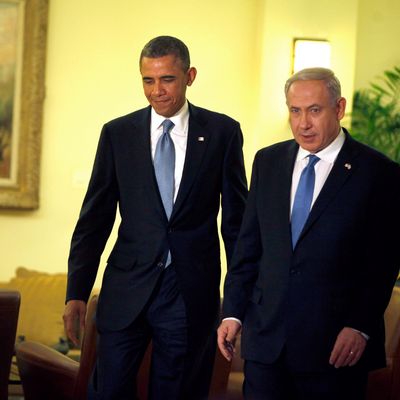
Prime Minister Benjamin Netanyahu’s Likud party won a surprising resounding victory in Tuesday’s parliamentary election in Israel. As the Knesset’s leadership appears likely to inch further to the right, the locus of goodwill toward Israel in the United States appears to be heading the same way — which it was doing well before anyone knew what would happen yesterday. Netanyahu’s announcement Tuesday that he no longer supports a two-state solution for peace, as well as the Facebook post warning that “Arab voters are coming out in droves to the polls,” both seem destined to cast a shadow over U.S.-Israeli relations for a long time to come.
White House Press Secretary Josh Earnest told reporters on Wednesday that “based on Prime Minister Netanyahu’s comments, the United States will re-evaluate our position and the path forward.” Secretary of State John Kerry called Netanyahu to congratulate him, and David Simas, a director of political strategy and outreach at the White House, told CNN, “The United States and Israel have a historic and close relationship and that will continue going forward.”
House Minority Leader Nancy Pelosi echoed the muted response to the electoral results at a press conference on Wednesday, as well as an acknowledgment of Netanyahu’s changed rhetoric on peace. “I respect the results that they have produced,” she said. “I think that what they have produced will be a continued lively discussion about the peace process.”
But among potential Republican presidential candidates, there were competitive attempts out-gush each other when speaking about Netanyahu’s win.
Senator Ted Cruz said that Netanyahu’s “electoral success is all the more impressive given the powerful forces that tried to undermine him, including, sadly, the full weight of the Obama political team.” Former presidential candidate Rick Santorum also framed the results as a victory over Obama — the currently trendy way of framing all elections. He tweeted, “It appears @Netanyahu overcame force of the Obama $ & staff. Praying for the peace of Jerusalem.”
Jeb Bush noted on Facebook that the prime minister is “a true leader who will continue to keep Israel strong and secure.” Wisconsin Governor Scott Walker said that Likud’s win is “a hard-earned victory,” and that “now the U.S. and Israel must stand together and stand up to Iran.” Other 2016 contenders called Netanyahu “Churchillian,” “a Churchill in a world full of Chamberlains,” and a “man of courage, candor, and strength.” Netanyahu has a history of being friendly with GOP presidential candidates.
House Speaker John Boehner, who invited Netanyahu to speak to Congress without consulting the White House, offered his “heartfelt congratulations” on Twitter. As David Makovsky, director of the Project on the Middle East Peace Process at the Washington Institute for Near East Policy, told The Wall Street Journal, “It’s going to be a very bumpy ride through the end of the Obama administration.”





























